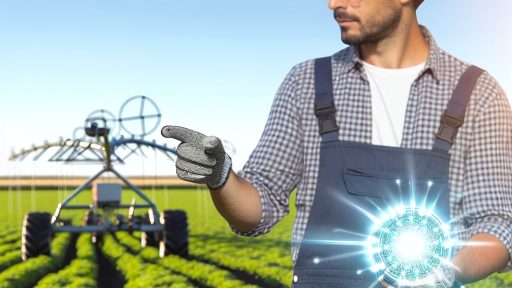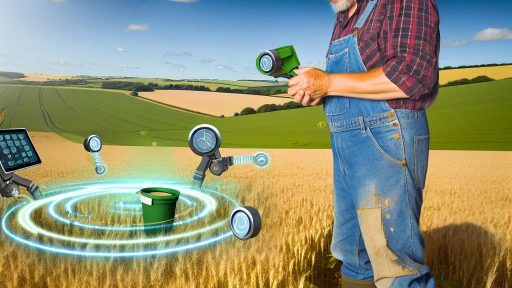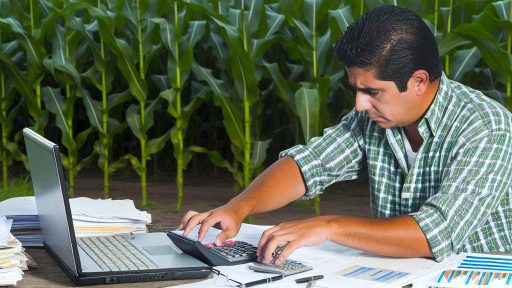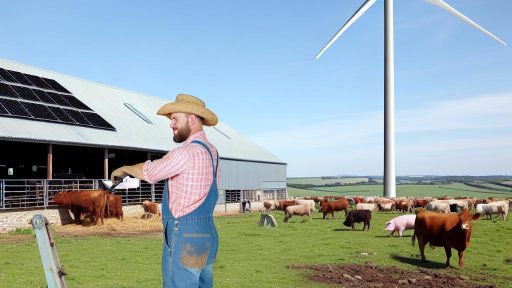Introduction to Blockchain Technology in Farming
Blockchain technology revolutionizes many industries, including agriculture.
This innovative system enhances efficiency in farming supply chains.
Farmers benefit from increased transparency and traceability.
Additionally, it helps reduce fraud and increase trust among stakeholders.
Understanding Blockchain Basics
Blockchain functions as a decentralized digital ledger.
It records transactions across multiple computers securely.
This technology prevents unauthorized alteration of data.
Moreover, it enables every participant to access real-time information.
Benefits of Blockchain in Agriculture
Farmers can track their products from farm to table.
This visibility helps ensure product authenticity.
Subsequently, consumers gain confidence in the food they purchase.
Additionally, streamlined processes reduce operational costs.
Implementing Blockchain Solutions
Adopting blockchain technology requires collaboration among stakeholders.
Farmers, distributors, and retailers must work together.
They can create a unified platform that benefits all parties involved.
Transform Your Agribusiness
Unlock your farm's potential with expert advice tailored to your needs. Get actionable steps that drive real results.
Get StartedFurthermore, training and education are essential for effective implementation.
Challenges and Considerations
Despite its advantages, challenges exist in adopting blockchain.
Data privacy and security concerns require attention.
Furthermore, the initial costs of implementation can be significant.
Nevertheless, the long-term benefits often outweigh these challenges.
Current Challenges in Farming Supply Chains
Inefficiencies in Logistics
Logistics inefficiencies plague farming supply chains.
Many farmers face delays in transporting goods.
Additionally, improper routing leads to increased costs.
These issues ultimately reduce profitability for farmers.
Lack of Transparency
Transparency remains a significant challenge in the industry.
Consumers often lack visibility into product origins.
As a result, trust between producers and buyers shrinks.
Furthermore, misinformation about product quality can arise.
High Operational Costs
Operational costs continue to rise across the sector.
Farmers struggle with expensive storage and transportation.
Moreover, fluctuating prices affect overall financial stability.
This instability makes it difficult for farmers to plan.
Fragmented Communication
Communication breakdowns contribute to supply chain issues.
Farmers often find it challenging to connect with distributors.
Consequently, miscommunication leads to overproduction or shortages.
These problems affect customers and profits alike.
Vulnerability to Fraud
Fraud poses a considerable risk in farming supply chains.
Farmers may fall victim to counterfeit products or scams.
Additionally, misrepresentation threatens the integrity of goods.
Showcase Your Farming Business
Publish your professional farming services profile on our blog for a one-time fee of $200 and reach a dedicated audience of farmers and agribusiness owners.
Publish Your ProfileThis vulnerability can severely damage brand reputation.
How Blockchain Enhances Transparency in Agriculture
Incrementing Traceability
Blockchain technology allows for real-time tracking of agricultural products.
Every transaction is recorded on a public ledger accessible to all stakeholders.
Farmers can trace the origin of their products easily.
Consumers gain insights into the food’s journey from farm to table.
This increased traceability builds trust and accountability among participants.
Moreover, it enables faster response to food safety issues.
Documenting Supply Chain Changes
Blockchain enables the documentation of every supply chain change.
This feature simplifies the identification of potential problems or delays.
Stakeholders can access reliable historical data at any time.
Moreover, this data helps in analyzing the supply chain’s performance.
By documenting changes, blockchain supports better decision-making.
Enhancing Information Sharing
Blockchain fosters efficient information sharing among different parties.
It connects farmers, distributors, retailers, and consumers effortlessly.
Data is updated in real-time, ensuring that everyone has the latest information.
This collective access enhances coordination along the supply chain.
Consequently, it reduces misunderstandings and discrepancies.
Reducing Fraud and Misrepresentation
Blockchain minimizes the risk of fraud and misrepresentation in agriculture.
Each product’s history is immutable and transparent, preventing tampering.
Farmers and suppliers can prove the authenticity of their claims.
Additionally, it deters unethical practices in sourcing and labeling.
This integrity in the supply chain boosts consumer confidence.
Streamlining Payments and Transactions
Smart contracts on blockchain streamline payments between stakeholders.
These contracts automate transactions based on predefined conditions.
This automation reduces delays and ensures timely payments.
Furthermore, it eliminates the need for intermediaries in transactions.
This efficiency leads to cost savings across the supply chain.
Gain More Insights: Security Considerations When Choosing Farm Management Software
The Role of Smart Contracts in Automating Transactions
Introduction to Smart Contracts
Smart contracts represent automated agreements stored on the blockchain.
They execute transactions once predefined conditions are met.
This technology eliminates the need for intermediaries.
Enhancing Transparency in Transactions
Smart contracts provide a transparent transaction process.
All parties can view the terms and execution of the contract.
This visibility builds trust among stakeholders in the supply chain.
Moreover, transparency helps identify potential fraud quickly.
Streamlining Payment Processes
Automated payment systems reduce delays in transactions.
Smart contracts facilitate instant payments upon completion of tasks.
This efficiency improves cash flow for farmers and suppliers.
As a result, businesses can reinvest earnings faster.
Reducing Costs through Automation
Smart contracts minimize administrative expenses related to transactions.
Showcase Your Farming Business
Publish your professional farming services profile on our blog for a one-time fee of $200 and reach a dedicated audience of farmers and agribusiness owners.
Publish Your ProfileBy automating processes, they decrease the need for manual intervention.
Consequently, this leads to significant operational savings.
In turn, these savings can be passed on to consumers.
Case Studies and Real-World Applications
Several companies are already utilizing smart contracts effectively.
FarmDoc, for instance, automates crop insurance claims.
This innovation speeds up the process of receiving payouts.
Additionally, AgriLedger enhances traceability through smart contract usage.
Challenges and Considerations
Despite their benefits, smart contracts face some challenges.
Implementing these systems requires significant technological investment.
Also, users need proper training to understand and utilize the technology.
Finally, legal standards surrounding smart contracts are still evolving.
Uncover the Details: Ethical Considerations In Agricultural Biotechnology
Traceability and Food Safety
Importance of Traceability in Farming
Traceability ensures that food products can be tracked throughout the supply chain.
This tracking confirms the origin of products, enhancing quality assurance.
Furthermore, it allows for quicker responses to food safety issues.
In case of contamination, farms can quickly identify and manage affected products.
As a result, consumer confidence in food safety increases significantly.
Blockchain Technology Enhancing Transparency
Blockchain provides an immutable record of every transaction in the supply chain.
This technology creates a single source of truth accessible to all stakeholders.
Each party in the supply chain can verify product authenticity almost instantly.
Additionally, this transparency helps reduce fraud in food labeling and sourcing.
It also supports compliance with regulatory requirements effectively.
Benefits of Improved Food Safety Practices
Food safety practices benefit significantly from enhanced traceability and transparency.
They reduce the risk of foodborne illnesses among consumers.
Moreover, they minimize financial losses for producers due to recalls.
In effect, these practices lead to an overall healthier food supply chain.
Ultimately, they bolster brand reputation and customer loyalty.
Case Study: Farm Fresh Produce
Farm Fresh Produce adopted blockchain to track their organic tomatoes.
With this technology, they can trace each batch back to the specific fields where it was grown.
When a food safety issue arose, they quickly isolated the affected batches.
This rapid response minimized the potential for widespread health risks.
Consequently, consumer trust in their brand improved due to their proactive measures.
Uncover the Details: Leveraging Digital Finance Tools To Boost Agricultural Productivity
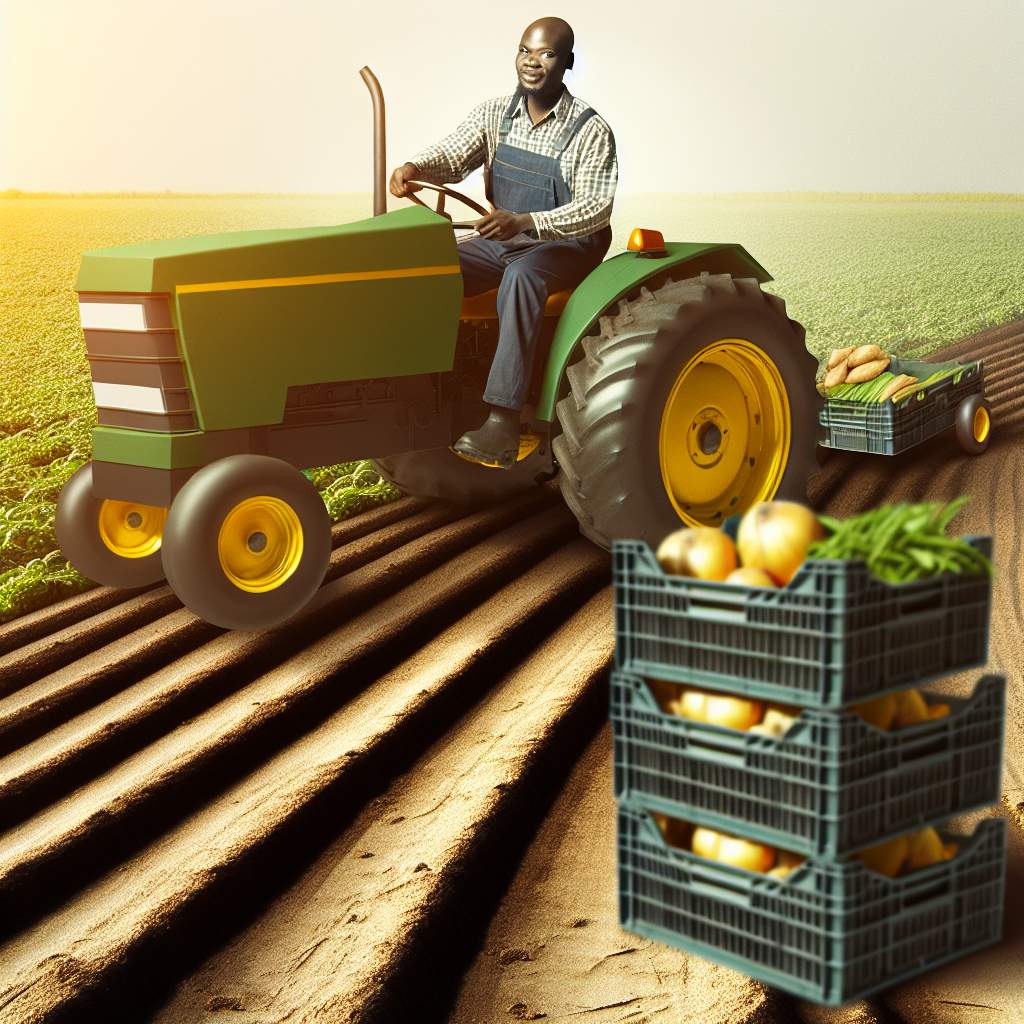
Decentralized Data Management
Securing Farmer Information
Decentralized data management enhances data security for farmers.
It utilizes blockchain technology to protect sensitive information.
This approach prevents unauthorized access and data breaches.
Importantly, farmers maintain control over their own data.
As a result, trust is established within the supply chain.
Benefits of Data Decentralization
Decentralization offers numerous advantages for farmers.
First, it improves data accuracy and consistency.
Showcase Your Farming Business
Publish your professional farming services profile on our blog for a one-time fee of $200 and reach a dedicated audience of farmers and agribusiness owners.
Publish Your ProfileMoreover, it reduces the risk of data manipulation.
Farmers can rely on real-time information for decision-making.
Additionally, this system encourages transparency among stakeholders.
Implementation of Decentralized Systems
Implementing a decentralized system requires careful planning.
First, farmers must choose reliable blockchain platforms.
Next, they need to train personnel on the technology.
Furthermore, collaboration with tech partners is crucial.
Lastly, ongoing support and updates ensure system efficacy.
Case Studies of Successful Implementations
Several initiatives demonstrate the effectiveness of this approach.
Agriculture Blockchain Alliance utilizes a decentralized model.
This initiative enhances traceability in the supply chain.
Another example is the IBM Food Trust project.
It connects farmers with retailers to boost accountability.
Learn More: Maintenance Tips For Agricultural Automated Machinery
Integrating IoT Devices with Blockchain for Improved Efficiency
Understanding IoT in Agriculture
IoT devices play a crucial role in modern agriculture.
They collect real-time data on crop health and soil conditions.
Farmers can monitor their fields remotely through these devices.
This level of monitoring helps them make informed decisions.
Benefits of IoT Integration
Integrating IoT with blockchain enhances data integrity.
This ensures that the data collected is reliable and tamper-proof.
As a result, farmers can trust the insights they receive.
Furthermore, it streamlines communication within supply chains.
How Blockchain Enhances IoT Functionality
Blockchain technology secures the data generated by IoT devices.
Every data transaction is recorded on a decentralized ledger.
This promotes transparency and traceability in farming operations.
Farmers can track the origin of their produce with ease.
Implementing Smart Contracts
Smart contracts automation simplifies processes within the supply chain.
They execute transactions based on predefined conditions.
This reduces delays in payments and product deliveries.
Ultimately, it fosters trust among all participants.
Challenges to Consider
Despite the advantages, challenges remain in implementation.
Infrastructure limitations can impede widespread adoption.
Moreover, farmers may require training to use new technologies.
Addressing these challenges is crucial for successful integration.
Case Studies: Successful Implementation of Blockchain in Agriculture
Enhancing Traceability with Blockchain
FarmTrace Inc. demonstrates the power of blockchain in traceability.
The company links farmers directly to consumers using digital ledgers.
This method boosts transparency and ensures product authenticity.
Moreover, customers can easily track the origin of their food.
This implementation has increased consumer trust in the brand.
Improving Supply Chain Efficiency
AgriChain Solutions has transformed supply chain management through blockchain.
Showcase Your Farming Business
Publish your professional farming services profile on our blog for a one-time fee of $200 and reach a dedicated audience of farmers and agribusiness owners.
Publish Your ProfileThe technology automates and streamlines processes in real-time.
It eliminates the need for intermediaries, reducing costs significantly.
Farmers experience faster payments for their produce now.
Consequently, this innovation enhances overall productivity in farming.
Case Study of Smart Contracts in Action
GrowSmart has introduced smart contracts for better deal automation.
These contracts execute transactions automatically upon meeting conditions.
This approach minimizes delays and disputes in agricultural trades.
Farmers appreciate the clarity and speed of these transactions.
As a result, business relationships have become stronger.
Future Prospects for Blockchain in Agriculture
Looking ahead, more farms are likely to adopt blockchain technology.
This trend points toward more efficient and transparent systems.
Data security will also improve, protecting sensitive information.
In the long run, blockchain can revolutionize how agriculture operates.
Therefore, the agricultural sector stands to benefit greatly from these innovations.
Additional Resources
Innovation with a Purpose: The role of technology innovation in …
Enhancing smart farming through the applications of Agriculture 4.0 …

